| Srl | Item |
| 1 |
ID:
126675
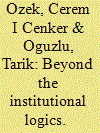

|
|
|
|
|
| Publication |
2013.
|
| Summary/Abstract |
This article aims to explain the slowing down of European Union (EU)-Turkish relations since the start of the accession negotiations in 2005 with international level systemic analysis. For this purpose, it examines the current challenges the new rising powers pose to the US-led unipolar international order and it shows how both the EU's and Turkey's responses to these challenges influence their relative powers as well as the negotiation process. By focusing on international level systemic dynamics, the article differs from the institutional explanations that explain EU-Turkish relations either with the utility-based logic of consequentialism or the norms-based logic of appropriateness.
|
|
|
|
|
|
|
|
|
|
|
|
|
|
|
|
| 2 |
ID:
126671
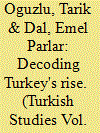

|
|
|
|
|
| Publication |
2013.
|
| Summary/Abstract |
Acknowledging Turkey as a rising power, and having commonalities in both objectives and outcomes with the other rising Southern powers, this study is a modest attempt to decode Turkey's rise with/within the West discursively and empirically and at multiple levels: systemic, regional and agent-based domestic. It aims to contribute to the debate over rising powers by developing new conceptualizations and challenging or reinterpreting the existing theoretical approaches in order to define Turkey's current power status vis-á-vis both other rising powers and the major Western powers. Turkey's recent rise, which has also been characterized by the country's high economic growth, must be nuanced from that of the Global South countries in some principal aspects. Unlike other rising powers, the Western factor weights more heavily in Turkey's recent rise. This issue's novel contribution to the existing literature on Turkish foreign policy is its attempt to understand Turkey's current rise, as well as its limitations in the context of its decades-long institutionalized and strategic relations with the West.
|
|
|
|
|
|
|
|
|
|
|
|
|
|
|
|
| 3 |
ID:
084076


|
|
|
|
|
| Publication |
2008.
|
| Summary/Abstract |
Turkey's heavy involvement in Middle Eastern politics following the end of the Cold War eroded its Western image in the eyes of most Europeans and strengthened the hands of those who have traditionally argued against Turkey's EU membership by referring to the unbridgeable inherent differences between the parties in terms of cultural, historical, religious, and geographical considerations.
|
|
|
|
|
|
|
|
|
|
|
|
|
|
|
|
| 4 |
ID:
093660
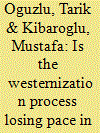

|
|
|
|
|
| Publication |
2009.
|
| Summary/Abstract |
The logic of interest, which has gained considerable ground in foreign policy formulation in Turkey, is not rooted in Western identity, nor is it contingent upon the degree of interaction exclusively with the Western world. The entire world has equal prominence in Turkey's foreign policy orientation. Whether the prevalence of the logic of interest in the formulation of Turkish foreign policy under the "post-Islamist" AKP government signifies a deviation from the Westernization process or whether it is simply a reaction to the conjunctural developments in the international arena in order to preserve Turkey's national interests is seriously debated. This paper aims to contribute to this debate by shedding light on the background of developments both inside and outside Turkey.
|
|
|
|
|
|
|
|
|
|
|
|
|
|
|
|
| 5 |
ID:
126681
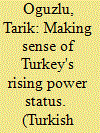

|
|
|
|
|
| Publication |
2013.
|
| Summary/Abstract |
This paper argues that Turkey only partly fits the mold that describes the rising BRICS countries, and so it is useful to designate Turkey as a special case in the rising powers literature. On the one hand, Turkey has gained from the post-Cold War international structure by expanding its outreach to a broader international audience. However, contrary to many common characterizations of other rising powers such as the BRICS, this new position has not recast Turkey as a revisionist actor bent on distancing itself from the West and challenging the Western order, or standalone actor in regional politics. Indeed, it would be incorrect to conflate Turkey's increasing international prominence with growing strategic independence from the West. In fact, Turkey's economic and political ascent remains deeply contingent upon preserving its bonds with the Western world.
|
|
|
|
|
|
|
|
|
|
|
|
|
|
|
|
| 6 |
ID:
076916
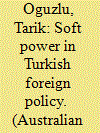

|
|
|
|
|
| Publication |
2007.
|
| Summary/Abstract |
This article examines to what extent Turkey's foreign policy identity has transformed from being a 'hard power' to a 'soft power' over the last few years. In doing so, this article also contends that there is a close relationship between the degree of securitisation of issues and whether the power used to deal with them is hard or soft in nature. If issues of concern were securitised, the tendency to use hard power would increase. Another argument is that the main difference between these two types of power stems from the kind of 'logic of action' that governs the behaviour of agents. If an instrumental logic of action were in play, meaning if the goal were to force others to make a cost-benefit analysis through coercing or coaxing strategies, then one could talk about hard power. If the goal were to ensure that others would automatically follow the lead of the power-holder due to the power of attraction the latter has in the eyes of the former, then one could refer to the existence of soft power. The main conclusion of this article is that recent internal and external developments have contributed to Turkey's soft power potential.
|
|
|
|
|
|
|
|
|
|
|
|
|
|
|
|
| 7 |
ID:
101321


|
|
|
|
|
| Publication |
2011.
|
| Summary/Abstract |
Tarik Og(uzlu argues that even though Turkish foreign policy has in recent years become Europeanized, the driving force of this Europeanization has not been Turkey's accession process with the European Union or its desire to prove its European identity.
|
|
|
|
|
|
|
|
|
|
|
|
|
|
|
|
| 8 |
ID:
116610


|
|
|
|
|
| Publication |
2012.
|
| Summary/Abstract |
Turkey's view concerning its commitment to NATO is changing. NATO has always been the most prestigious institution binding Turkey to the West, but Turks are beginning to question whether NATO is still indispensable to Turkey's foreign and security policies. During the Cold War, Turkey's commitment to NATO was largely identity-driven.1 Membership in NATO suited Turkey's goal of pursuing a Western/European identity, and was justified by the Westernization goals of the founders of the Republic. Even though NATO's primary purpose at its inception was to help secure the territorial integrity of its members against the Soviet Union, the Alliance also symbolized the unity of nations which embrace liberal-democratic norms at home and abroad; it offered a security blanket under which European allies could intensify their supranational integration process and turn Europe into a Kantian security community.2 Joining NATO in 1952 was therefore a logical follow-up step to Turkey's membership in the Council of Europe (1949), and helped Turkey legitimize the claim that it was a Western/European country, representing the Western international community in the Eastern Mediterranean.
|
|
|
|
|
|
|
|
|
|
|
|
|
|
|
|